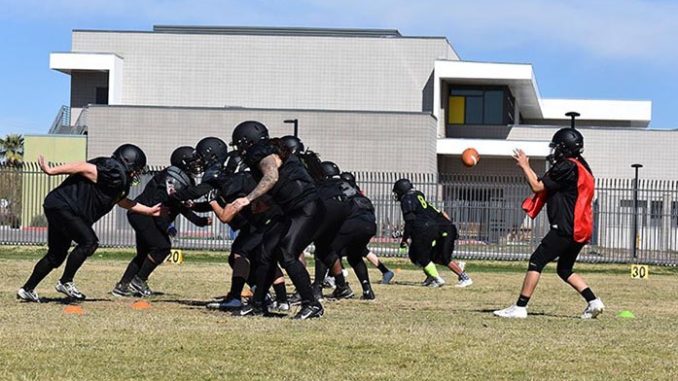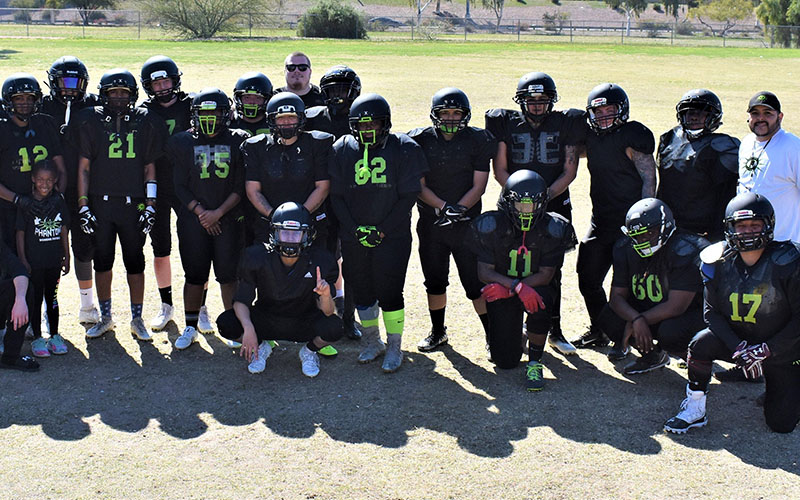
PHOENIX – Although records of women playing organized tackle football can be found as early as the 1920s, the sport has struggled to sustain any momentum.
That could be changing with the emergence of more women in NFL coaching positions and the presence of teams such as the Phoenix Phantomz.
The Phantomz are members of the Women’s Football Alliance, a league founded in 2009 with 59 teams playing in three divisions across the country.
“Women in football was the best kept secret in sports,” said Jen Welter, the first woman hired to an NFL coaching staff when she was Cardinals’ defensive coaching intern during 2015 training camp. “The key is that we didn’t want to be a secret anymore. And I think for the first time, you’re starting to see the recognition and acknowledgement that women are in football. They belong in football and that they can play the game.”
The WFA produced Welter; Katie Sowers, the San Francisco 49ers assistant coach who became the first female to coach in a Super Bowl; and Lori Locust, who is one of two women coach Bruce Arians named to his staff of assistants with the Tampa Bay Buccaneers.
This season, the WFA struck a television deal with Eleven Sports/FTF (For the Fans) Network to televise 10 WFA Games of the Week, the playoffs and the WFA National Championship.
Like other leagues throughout sports, the WFA has postponed the start of its season because of the Covid-19 pandemic. The league, and the Phantomz, hope to begin play on May 2.
The Phantomz were founded in 2011 by Tabitha McBride and compete in the WFA Division 3, the league’s largest division. They are made up of players from various backgrounds, most of which do not include playing football.

Many players on the Phantomz didn’t play any organized tackle football when they were young but were intrigued when presented the opportunity. (Photo courtesy of Phoenix Phantomz)
Jah Clay, a defensive back on the team, grew up playing sports such as basketball and softball, but football was not available for her. However, playing tackle football, she said, was always a dream.
“I never played as a kid,” Clay said. “I didn’t feel like I wanted to take that away from my brothers. In the street, yes, that’s where all these scars come from. But other than that, it was definitely something that I’ve always wanted to do.”
Shannon Cooley, an Arizona State student and wide receiver for the Phantomz, said she grew up watching hockey but was never into football. She joined the team when she saw an ad for another team in the league. It led to her research the Phantomz and she is now entering her second season with the team.
Cooley is proud of her experience so far.
“It’s been crazy,” Cooley said. “I never thought last year that it would be like this. A year ago, I didn’t even know how to put on a helmet, and now I’m playing on a real team with some people who like to kick ass.”
Leilani Parker, a veteran of five WFA seasons, grew up a huge football fan and said she entered the league the same way Cooley did, by coming across videos of women’s football that intrigued her.
“Really, it was social media,” Parker said. “I just started seeing some girls posting videos of them on teams. And I started researching a lot more and looking up local teams and just went out for a tryout in California; played with a team in California for four years and … really researched and found that there was an actual league for women’s tackle football and really wanted to be a part of it.”
Misconceptions are something the team has to deal with on a regular basis. Clay and Parker said when they tell people about the Phantomz, most people assume they play flag football or play in the X League (formerly the Legends Football League and Lingerie Football League).
“The first question, ‘Oh, what is it? Flag?’” Parker said. “Or, ‘It’s not lingerie, right?’ No, this is wearing pads and helmets. And then it really doesn’t hit them until I start showing them pictures and videos of us out there in pads and helmets hitting and running routes and stuff, and we’re really doing what the guys can do.”
Clay agreed, noting that the first thing she hears about when she mentions that she’s a football player is the X League. She said it is difficult to receive support outside of family members and said it is a challenge to be seen as “contenders” just as male football players are.
Clay said growing the league has to be done through networking.
“As for us individually, it is just getting our name out there, making connections and trying to make our presence known,” Clay said. “So (it’s) really making those contacts and doing a lot of our own scout work.”
Second-year Phantomz coach Joe Griffin, who took over the team operations role from McBride starting this season, said he enjoys coaching women’s football because it is teaching something new to most of the players.
Griffin, who also is an assistant coach at Mountain Pointe High School, said he thinks the players on the Phantomz are just as good, if not better than men he sees playing the game.
“We’re 11-on-11 football with full pads, shoulder pads, everything, and so they want to play and they’re just as good as some of the guys out there, if not better,” Griffin said. “We’ve got a lot of talent.”
Welter believes that support from the NFL, like the NBA has provided the WNBA, would help and might be possible down the line. However, she said it will require that the best players come together on fewer teams to improve the quality of play before the NFL is likely to be sold on the potential of the women’s game from a business standpoint.
“If they were going to do something like that, I think that right now … what needs to happen is that less becomes more,” Welter said. “I think you need the best teams competing to really showcase what women’s football is capable of. I think the challenge is that there are so many teams and so many leagues that it would be really hard to do that unless they want to start from scratch and create their own thing.”
Welter said one of the biggest challenges in growing the women’s game is the lack of opportunities for girls to play at an early age.
“It’s an easier jump for people to see girls who play in, basically like, peewee basketball and they’ve played junior high and they’ve played high school and then they go to college and play in big-time programs with scholarship funds,” Welter said. “They have all of that time to develop their game, and then they transition into pro players. There’s already been significant dollars put behind their development through the course of their athletic career.
“The challenge for football is that you have phenomenal athletes and phenomenal women and phenomenal people sacrificing everything that they have to put the best product they possibly can on the table, but they’re generally starting with people who haven’t gotten to play until after their college (years).
“So, it’s not a parallel path between basketball and football. That’s why the women playing the game will be directly impacted by earlier access and better coaching and more opportunities to play throughout their lifetime.”
Griffin believes that if high schools offered women’s football, there would be a large turnout.
She might be right.
State high school federations consider football a coed sport, and have resisted forming all-girls programs. That led Brent Gordon to help organize the Utah Girls Tackle Football League to give girls like his daughter Sam an opportunity to play tackle football against other girls.
Sam once scored 25 touchdowns during a youth tackle football season against boys as a 9-year-old, and videos that Brent posted made her an Internet sensation.
The Utah league, now 8 years old, did well enough to inspire the formation of the Indiana Girls Tackle Football League in 2016.
One of the first recorded examples of women playing organized tackle football came in 1926, when the NFL’s Frankford Yellow Jackets fielded an all-female team for halftime entertainment.
The Phantomz are proving the role of women in football has come a long way.
